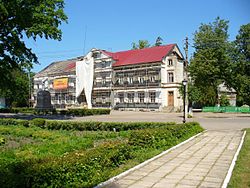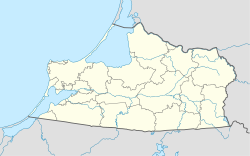Krasnoznamensk, Kaliningrad Oblast
| Krasnoznamensk (English) Краснознаменск (Russian) |
|
|---|---|
| - Town - | |
 Krasnoznamensky District Administration building in Krasnoznamensk |
|
 Location of Kaliningrad Oblast in Russia |
|
|
|
|
|
|
|
|
|
|
| Administrative status (as of December 2013) | |
| Country | Russia |
| Federal subject | Kaliningrad Oblast |
| Administrative district | Krasnoznamensky District |
| Town of district significance | Krasnoznamensk |
| Administrative center of | Krasnoznamensky District, town of district significance of Krasnoznamensk |
| Municipal status (as of May 2015) | |
| Urban okrug | Krasnoznamensky Urban Okrug |
| Administrative center of | Krasnoznamensky Urban Okrug |
| Statistics | |
| Population (2010 Census) | 3,522 inhabitants |
| Time zone | USZ1 (UTC+02:00) |
| Founded | 1734 |
| Previous names |
Haselpusch (until early 18th century), Lasdehnen (until 1938), Hasselberg (until 1946) |
| Postal code(s) | 238730 |
| on | |
Krasnoznamensk (Russian: Краснозна́менск), prior to 1938 known by its German name Lasdehnen and in 1938-1946 as Haselberg (Lithuanian: Lazdynai) is a town and the administrative center of Krasnoznamensky District in Kaliningrad Oblast, Russia, located on the Sheshupe River, 163 kilometers (101 mi) northeast of Kaliningrad, the administrative center of the oblast, and approximately 10 kilometers (6.2 mi) to the south of the border with Lithuania. Population: 3,522 (2010 Census).
After 1701 and until the unification of Germany, the town was politically in Prussia and remained a part of Germany from 1871 until 1945. Lithuanian influence is also a long-standing feature of the town.
The earliest surviving German-language record of the place dates from 1521 under the name Haselpusch (lit. hazel bush), while Russian sources give the date of the earliest record as 1576. Other sources state that it was established in 1734. In the early 18th century, the name changed to Lasdehnen, based on the Old Prussian/Lithuanian word for hazel bushes.
The village had a church by 1578 but it burned down in 1661 and the replacement building had to be taken down in 1869 due to severe structural defects. The current Gothic Revival church was built between 1874 and 1877.
...
Wikipedia



